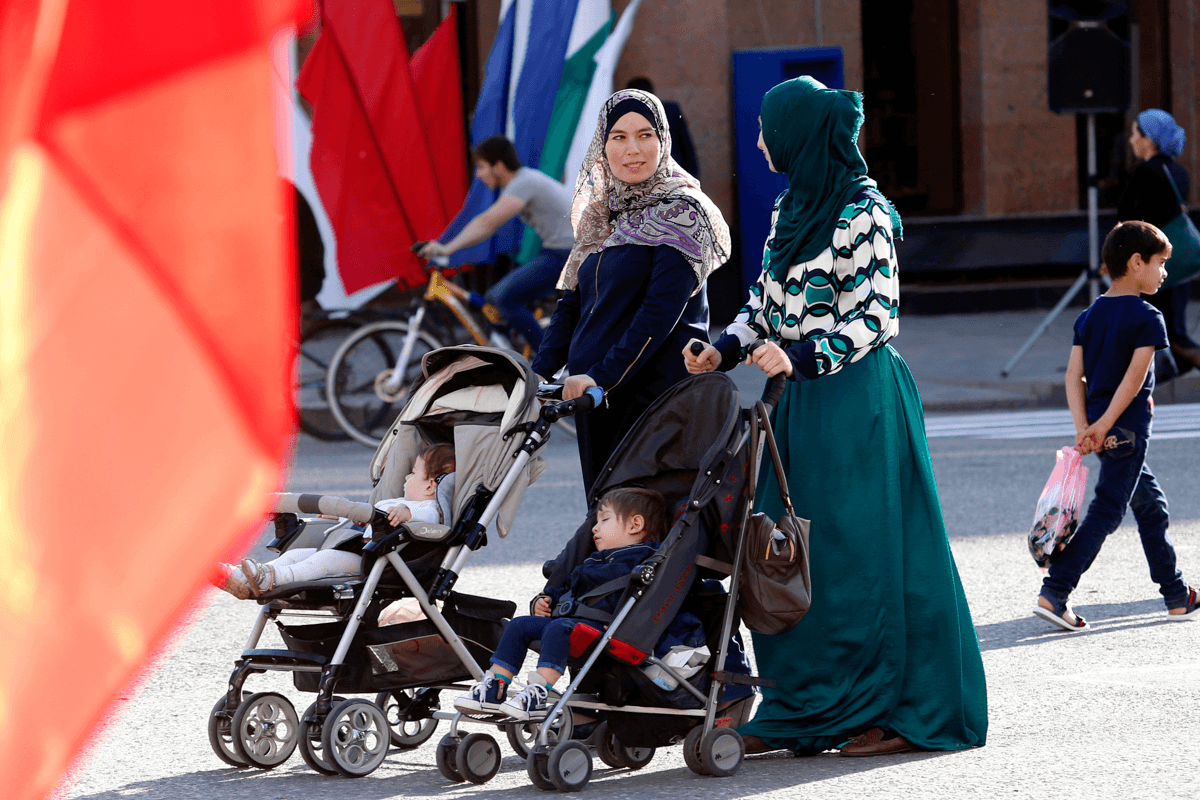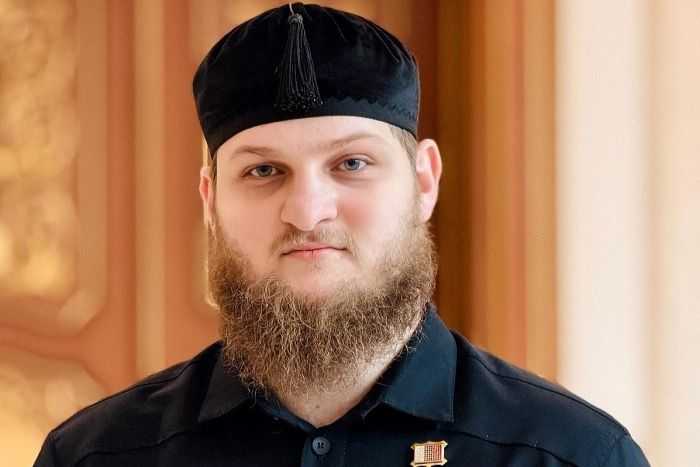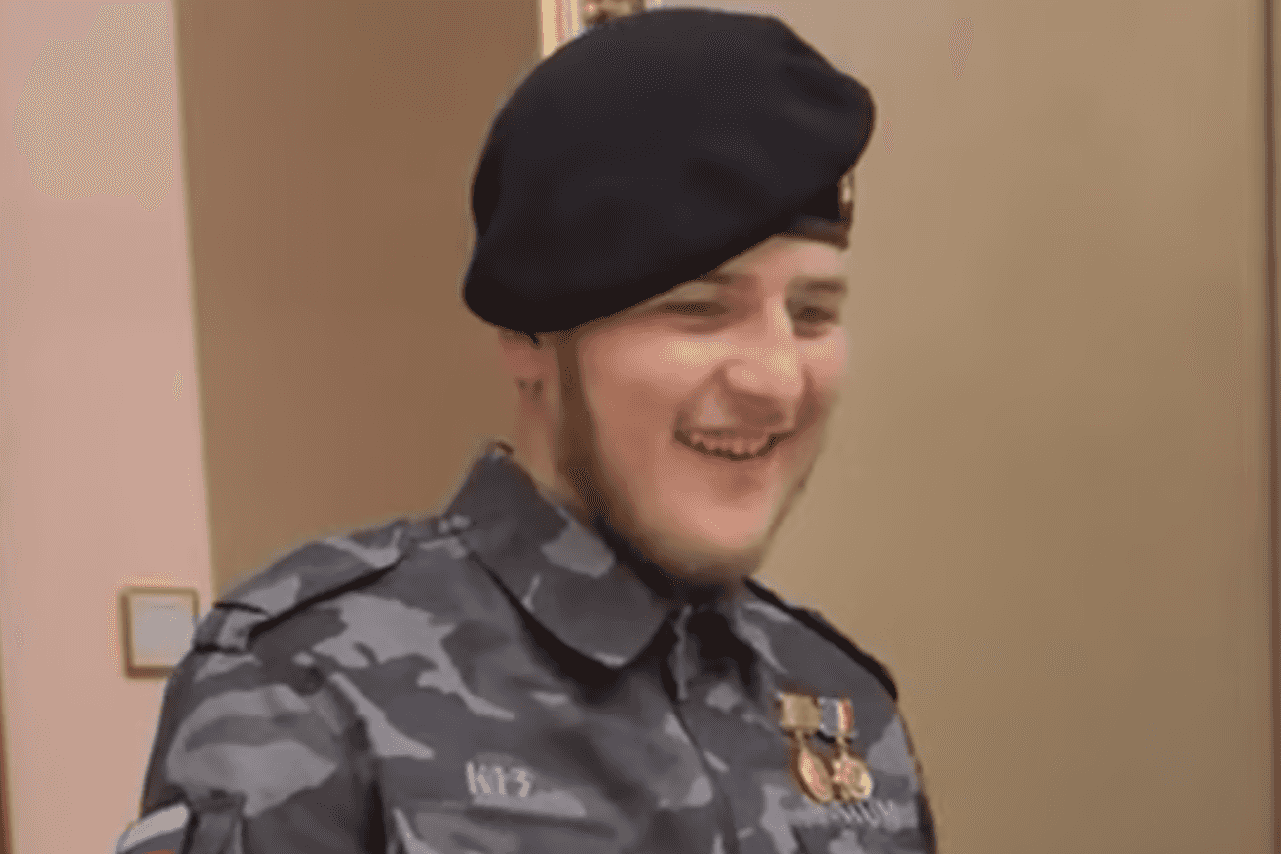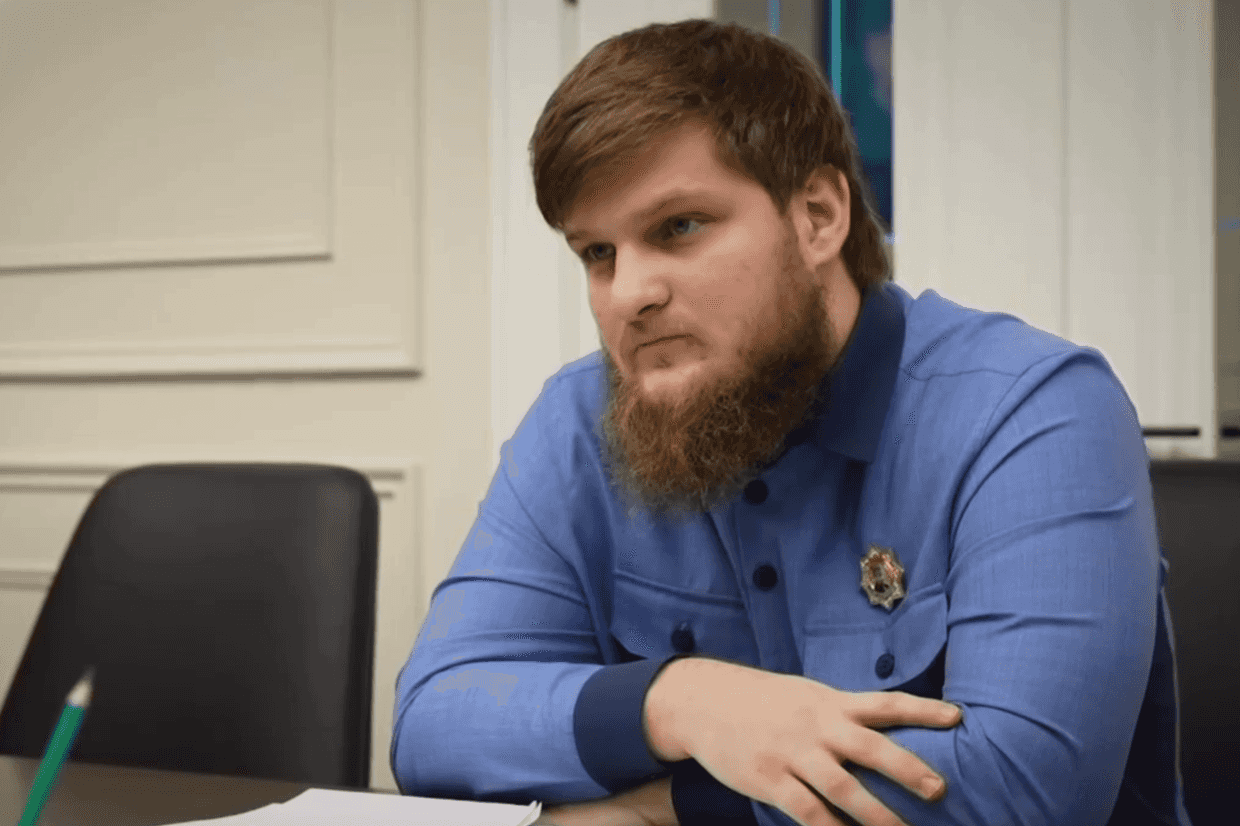
For much of 2023, rumours have suggested that the Head of Chechnya, Ramzan Kadyrov, is gravely ill, pointing to his physique, his actions and absences, and Putin’s political machinations as evidence. But some observers doubt that both Kadyrov’s denials, and the rumours themselves, are entirely what they appear to be.
In March 2023, some observers of Chechen politics suspected that history was about to repeat itself.
Vladimir Putin had unexpectedly invited Ramzan Kadyrov’s eldest son, 17-year-old Akhmat, to meet him in Moscow. Unusually, Ramzan himself was not present, amplifying suspicions in light of fervent rumours that the Chechen leader was in rapidly worsening health.
Almost twenty years earlier, in 2004, Putin had met with Ramzan after the murder of his father, Akhmat-Khadzhi Kadyrov, the first president of the Russian Republic of Chechnya. The meeting marked the beginning of Ramzan Kadyrov’s political rise, which has been characterised in significant part by his close allegiance to the Russian president.
In the months prior to and since Akhmat travelling to Moscow, Ramzan Kadyrov has appeared to be in poor physical form. Despite his frequent assertions that he is in excellent health, his face appears swollen, with his eyes sometimes barely open. Shortness of breath, which seems to sometimes prevent him from speaking on camera, and what some have suggested are IV marks on his hands have only prompted rumours regarding his health to intensify.
The theories vary, with media and commentators claiming variously that Kadyrov has severe kidney issues or is even already in a coma in the Kremlin.
Alongside these speculations come a series of broader questions: is the Kremlin angling to transfer power to Akhmat Kadyrov, what does a post-Ramzan Chechnya look like, and, if the allegations turn out to be entirely baseless, why did both the Kremlin and Chechnya allow them to unfurl as they did?
What’s happening to Ramzan Kadyrov?
The varied theories regarding Kadyrov’s illness all concur on one point: any ailment he is suffering from relates to his kidneys.
German tabloid Bild wrote in March that the head of the nephrology department of the Burjeel Hospital in Abu Dhabi, Dr. Yassin Ibrahim M El-Shahat, was said to have visited Chechnya. Bild claimed that the nephrologist was flown to Chechnya because Kadyrov ‘doesn’t trust Moscow doctors’.
Harold Chambers, a political and security analyst focused on the North Caucasus, is confident that despite recent events, two things remain obvious: Kadyrov is not in a coma and is not dead. Chambers adds, however, that Kadyrov does appear to be in poor health.
‘I think there is clearly something wrong, with Ramzan’s health having deteriorated in front of us all on Telegram’, says Chambers.

He states that while it seems likely that the issue does, in fact, relate to Kadyrov’s kidneys, there is no robust evidence regarding the cause, only ‘claims and narratives’.
In an interview with Ukraine’s Channel 24, Akhmed Zakayev, the leader of the Chechen republic of Ichkeria in exile, claimed that Kadyrov had travelled to the United Arab Emirates for treatment of ‘kidney problems’.
‘According to our information, he had a kidney transplant in the UAE, but it did not take root. Therefore, he experienced severe health complications’, said Zakayev.
The available evidence regarding Kadyrov’s illness is limited, with all theories based on photographs and videos of the Chechen head.
Nephrologist Irakli Mukhashavria from the American Hospital in Tbilisi underscores that while Kadyrov might have a kidney problem, it was not possible to make any kind of robust diagnosis based only on photographs.
But this has not stopped observers from speculating, mostly claiming that Kadyrov is either facing the consequences of a long-running drug addiction or being poisoned.
‘He has become dependent on these pills’
While Chechen Telegram channels have shared videos and speculation regarding Kadyrov’s unexplained changes in appearance, Akhmed Zakayev has been the most public advocate of those rumours, speaking particularly frequently to Ukrainian media.
His assertion is that Kadyrov has been using drugs for over 15 years that have led him to be in critically ill health, claiming that both unnamed sources and Kadyrov’s behaviour confirm this theory.
‘Our Ministry of Health explained to me what was wrong with him. And now he has become dependent on these pills or drugs, I don’t know what [exactly],’ Zakayev told UNIAN in February.
Zakayev claims that Kadyrov was sent to the UAE for kidney treatment after taking a gun from his guard and running around his home while intoxicated.
The head of Ukraine’s intelligence service, Kyrylo Budanov, has also lent his support to the theory.
‘He has problems with excessive use of narcotics, which he had to use for doping and then as a painkiller. And then a problem arose’, said the head of Ukrainian intelligence in an interview with ISLND TV.
Chambers suggests that while ‘nothing would surprise’ him regarding Kadyrov, there is not enough evidence to firmly defend the theory that Kadyrov’s illness is related to drug addiction.
‘Narcotics-related issues remain opaque, and there have been few cases where [the] claims come from multiple independent actors’, Chambers says.
‘Poisoned by Russia’
An alternative theory, frequently posited in Ukrainian media, is that Kadyrov has been poisoned by the Russian secret services.
One of the proponents of this theory is Oleksiy Danilov, secretary of Ukraine’s National Security and Defence Council.
‘The fact that Kadyrov was hunted — and hunted by the Russians — is a well-known struggle between groups that exist in the Kremlin’, said Danilov in September. ‘Taking into account the influence that he had and continues to have on processes in Russia, he found himself in such a situation’.
Danilov went so far as to suggest that Kadyrov might in fact be in a coma, suggesting that newly-posted videos could be ‘very old’
Sergei Zhirnov, a former Soviet KGB agent, similarly told Ukrainian media outlet UNIAN that Kadyrov’s ill health might be attributable to poisoning by one of the KGB’s successor organisations, the FSB, but was more cautious in his claims.
He stated that he believed that the FSB might have poisoned Kadyrov to ‘scare’ him, or to ‘create problems’ for Kadyrov so that his attention would be focused on that, ‘and he would not have time for a coup’.
However, he stated that Putin was likely to be uninterested in killing Kadyrov, because the Chechen head was ‘fulfilling a contract: you keep Chechnya under control, but you can do absolutely whatever you want there’. Instead, he claimed Kadyrov was likely to have been ‘slightly poisoned’ to create kidney issues creating the need for regular haemodialysis, and so prevent him from attempting to challenge Putin.
Zhirnov, however, also added that he did not rule out that Kadyrov might have developed a drug addiction.
Dzhambulat Suleymanov, head of Chechen diaspora group ‘United Power in Europe’, similarly suggested that Kadyrov could have been poisoned, but claimed that this was more likely to be by those seeking to weaken Putin than by Putin’s forces.
‘There is a behind-the-scenes internal political war. In this scheme, [Kadyrov is] Putin’s weakest point, the weak link, [which] is why they probably wanted to eliminate him. Depriving Putin of his most loyal footsoldier, as [Kadyrov] himself puts it’, says Suleymanov.
Like the idea that Kadyrov might have a drug abuse issue, the second theory is mainly spread by those with an interest in Kadyrov being in ill health, says Mark Youngman, executive director of the research consultancy Threatologist, adding that he considers the entire matter to be rumours and nothing more.
‘The sources of rumours are […] not entirely impartial: the channels of the Chechen opposition on social networks, Zakayev, and Ukrainian intelligence’, says Youngman. ‘All of them would certainly welcome the end of Kadyrov’.
He adds that while the theories could be correct, the evidence presented so far to support their claims has been ‘circumstantial at best’.
Youngman said that none of flights from Chechnya to Moscow, cars with Chechen licence plates parked near Russian hospitals, nor photographs of a bloated Kadyrov are reliable indicators of illness.
‘All of these may be indicators of serious problems, but equally they may not be’, says Youngman. ‘Kadyrov looked terrible for a while and remained highly active on the political scene.’
Fierce denials from Kadyrov
When rumours of Kadyrov’s illness began to spread, the head of Chechnya doubled down on his political activity.
Shortly after Akhmat Kadyrov met with Putin, Kadyrov made a visit to the Kremlin and met with the Russian president. He also published a post on his Telegram channel, in which he responded to the rumours.
‘For those who console themselves with the hope that I am terminally ill, I am sorry to upset you’, he declared on 15 March. ‘I am healthy and full of strength. As before, I engage in sports, go to the mountains, go hiking, and solve important issues of the republic’s development.’
‘It seems to me that the authors of these fantasies need a doctor’, added Kadyrov. ‘There’s something wrong with your minds, guys, contact a specialist.’
Kadyrov made similar posts in the weeks and months following. Despite changes to his external appearance, he affirmed that he was in excellent health; sometimes while walking, sometimes in sportswear, other times at political meetings.
Mark Youngman notes that such rumours are not specific to Kadyrov, with other political leaders facing similar speculation.
‘Kadyrov is, after all, mortal. He has not looked in great shape for some time now, so it is easy to jump to the conclusion that his demise is imminent’, says Youngman.
‘However, physical appearance is hardly a reliable indicator of a dictator’s longevity. Putin, after all, has been rumoured to be dying of cancer and other ailments for at least a decade, and, looking a little further afield, Erdogan has had one foot in the proverbial grave for quite a while too. Both appear to be very much in the world of the living’, says Youngman.
Youngman believes that without solid evidence, talk about the actual state of Kadyrov’s health is ‘rather speculative’.
‘We could be discussing who will attend his funeral in a week, but just as likely we could still be pondering what a post-Kadyrov Chechnya will look like a year from now’, Youngman says.
Chechnya without Ramzan
The rumours have nonetheless prompted many to consider what might take place in Chechnya once Kadyrov is no longer in the picture. The question often relates both to the potential popular response following years of suppression, and to the Kremlin’s reaction to the loss of Putin’s ‘loyal footsoldier’.
Youngman believes there are two main factors to note, particularly regarding the prospect of a continuation of the Kadyrov dynasty.
‘First, there is a difference between a dictator wanting someone to succeed them and the planned succession taking place without any difficulties. Kadyrov does appear to be trying to position his sons for the role, but that doesn’t mean that others would acquiesce in the transfer should Kadyrov no longer be on the scene’, he says.
Youngman also notes that whether there is any competition for the role would play a significant factor in the nature of the transition.
‘Kadyrov is a system as much as a person. If he were to be replaced by someone else – such as Akhmat Kadyrov, Adam Delimkhanov, or Magomed Daudov – the system could persevere without difficulties if their pre-eminence were quickly established’, says Youngman.
‘For example, if one of those three were to claim authority and the other two (and no less importantly, the Kremlin) swiftly indicated their acceptance of the claim, then the short-term change could be negligible’, explains Youngman. ‘If, however, you were to have a circumstance where there is more than one plausible claimant and uncertainty over the Kremlin’s preference, then considerable instability and violence is likely to ensue.’
Chambers suggests, however, that power to establish who and what follows Kadyrov lies ultimately with the Kremlin.
‘Putin considers Chechnya too important to allow government instability, and he has his pick of acting heads — a more neutral bureaucrat like Muslim Khuchiyev or an actual power-holder like Adam Delimkhanov or Magomed Daudov — although they would each present different dilemmas’, says Chambers. ‘This will be an unpopular opinion, but it does not really matter whether Ramzan [is] lying in a critical state or a coma.’
However, Chambers notes that there is more potential for uncertainty in relation to Chechens who oppose Kadyrov’s rule, with no way to know whether and how Chechen opposition figures and supporters of Chechnya’s independence might take the opportunity to take action.
‘It remains unclear how the Chechens fighting for Ukraine, or any others willing to fight for Chechen independence, could return home’, says Chambers. ‘There are still a number of significant hurdles to organised resistance starting domestically. The “Sons of Ichkeria” never appeared after their initial declaration’.
‘If or when Kadyrov dies, Chechnya’s relationship with Moscow will surely change, but not by much under the current conditions’, says Chambers.
But Chambers believes that the rumours, as with any press related to the head of Chechnya, ultimately benefit Kadyrov.
‘With such rumours, he can also add fuel to the fire by simply not appearing, which just draws even more attention. Then at the end of it all, he gets to reveal himself, say he’s fine, and make accusations against those who spread the rumours. He trolls as a hobby, and it almost always works.’








